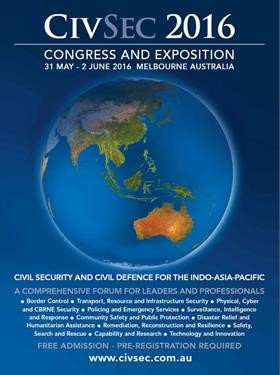Over 31 May and 1 June 2016 the Melbourne Convention Centre played host to the CIVSEC2016 Strategic Summit, which focused on the topic ‘Protecting Our Communities Against Threat—Safety, Security and Sovereignty in the 21st Century’. The summit was free, with presenters and delegates from wide-ranging civil security, safety and emergency services roles in government and industry. It also accommodated several specialist streams, from cybersecurity to aviation security, and featured an exhibition hall showcasing the latest tools, technology and education.
While sovereignty and border protection created the framework for the two days, presenters offered a wide range of insights and interpretations on the theme. Panellists ranged from academics to police officers, government officials to documentary-makers, and experts came from all corners, including Islamic Studies, criminology and biosecurity.
CIVSEC2016 kicked off with a large summit presentation and discussion that wove history and culture lessons with politics, technology and reviews of Australia’s tactical response programs. The most pressing issue, judging by the audience questions, was on how to prevent expatriation of Australians to terrorist organisations abroad and, if they were not killed or changed while away, how to assist their reintegration here.
With an ideology so clear and compelling, Islamic extremists often have the upper hand in recruiting impressionable would-be warriors. Many of these people are young outsiders, underserved by society. Surprisingly few are new arrivals to Australia; most are first or second generation migrants with strong connections to their parents’ or grandparents’ home country. While there are security programs in place to prevent terrorist activity in Australia, it is difficult to tackle the ideology, the experts conceded.
Several panellists put forward the need to create a strong counternarrative to dissuade potential fighters from joining terrorist causes but current programs are still in their early days, thus no results are available yet.
Beyond borders
The summit incorporated Border 21, an international conference on ‘The First and Last Line of Defence: Border Security Challenges in the Evolving World’ segmented into five themes: Border Security in the Age of Global Transformation, Protecting and Defending National Borders, Border Security Challenges for Australia and Beyond, Border Security Challenges in the Maritime Domain, and The Threat Spectrum.
Several speakers unwittingly riffed on an interesting subtheme that focused less on what to do about new arrivals, whether migrants or asylum seekers, and more on the causes of movement across borders. This ranged from advances in technology rendering some forms of employment obsolete—therefore creating economic pressure to relocate—to war, climate change and food and water shortages.
Many presenters ended with hopeful visions of the future for border security. New technology and improving cross-border collaboration were the two areas that held the most promise for the security experts, and both these could be applied to different problems, whether to prevent international crime or support better migration practices.
Collaboration is the starting point for many solutions, which is why events like CIVSEC2016 are an important way to bring people with the same goal together so they may meet and discuss the issues of the day, and together prepare themselves for the issues of tomorrow.
—Adeline Teoh






